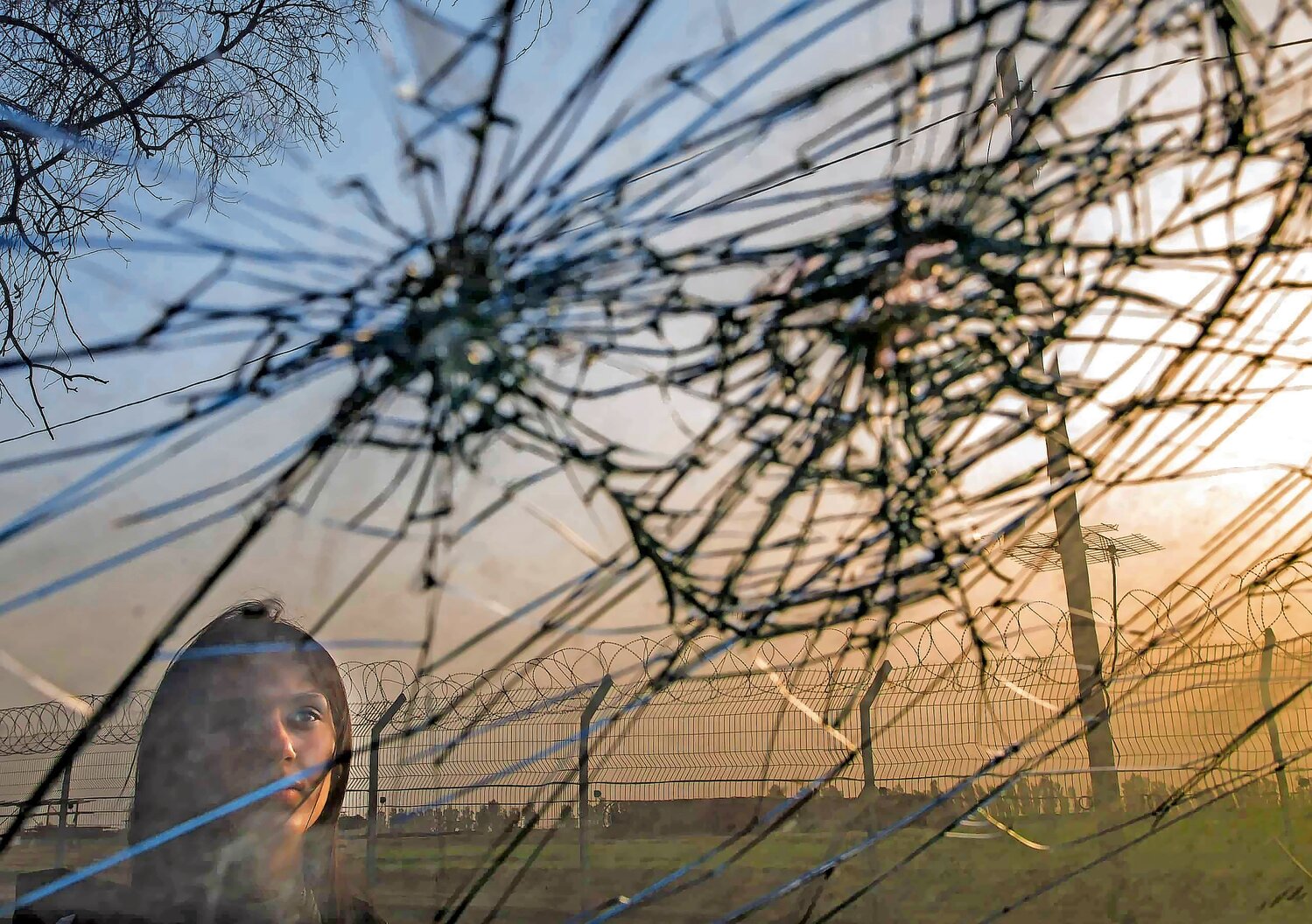Gaza border kibbutzniks waiting to come home
“If the terrorists get in, kill me and then the dogs.”
It was the deadly morning of Oct. 7 in Kibbutz Nirim.
Huddled in their safe room with their two dogs, a young Israeli couple heard the gunfire and the shouts of Hamas terrorists who had just overrun this southern communal farm, along with more than 20 towns and villages near the border with Gaza.
Moments earlier, Michelle Mari, 22, had begged her boyfriend, Amit Shaar, 22, not to leave the safe room to go to his sister’s home, which was under attack nearby. Shaar’s father also urged him by text message to stay put.
He took a shirt and tied it to the door handle of their shelter to hold it closed, while staying away from the door itself so as not to be shot.
As bullets hit the window of their sealed room, Mari uttered the harrowing words.
“Chag sameach, Jews!” the Palestinian attackers shouted from outside.
• • •
An unnatural silence hung in the autumn air in Nirim on Sunday afternoon as a handful of survivors of the Oct. 7 attack took advantage of the ceasefire with Hamas to return home to pick up some personal effects, and inspect the damage. Military personnel were on guard.
“Here’s the shirt he used,” said Mari, pointing to the knotted blue garment still lying on the bed. The mats of their two dogs, Belle and Tokyo, were still in place.
In the seven weeks since the attack, the grass has grown wild at the kibbutz. Cats amble the grounds and rabbits furtively burrow in empty gardens. Like other villages in the area, Nirim, less than a mile from the border with Gaza, is still a closed military zone, with only residents allowed in, and will likely remain shuttered for months more. The lifeless stillness is unnatural, and together with the gutted cars and burned homes near the edge of the kibbutz, haunting.
“Of course we’re eager to get back home,” Mari said as she walked through the desolate kibbutz, checking out the damage. “But there’s also a gnawing fear of what will happen if we do.”
“There are days I asked myself how will I sleep here, but if we cave to these fears then they have won,” she said.
However, Barel Efraim, a 37-year-old father of three, said he’s not bringing his family back unless something changes.
“We are currently talking about today and tomorrow,” he said, broom in hand. He was cleaning up his home, the scene of a shootout between Israeli security forces and two terrorists while he and his family were hiding in the sealed room.
“If Hamas will be on the border like before, we aren’t coming back,” he said, adding that something — a security zone, an international force — needs to be put in place. “Your home is always your security, and for us there is no sense of security,” he said. “At the same time, if I leave my house, they won, because that is what they wanted.”
During the attack, his wife asked for the sharpest knife in the kitchen to protect her children, aged 3, 6 and 8, as they hid in the shelter, and, in the rush, he grabbed a mallet that she used for schnitzel and a rolling pin, he said, both now neatly arranged back in the kitchen cabinet.
Efraim noted that he had always wanted to carry a weapon, but that before the attack his wife was afraid of having one in the house. Now she has told him that if they come back, they will both have guns, he said.
“Of course we’ll be back,” said Eli Uzan, 46, a member of the kibbutz emergency response team. “We know where we’re living,” he said. “We’re not in [the swanky Tel Aviv district of] Ramat Aviv.”
“We will return,” concurred kibbutz farmer Bar Hefetz, 47, a father of two who has an avocado field and was awaiting a group of hired workers after his Thai laborers went home. “We’re farmers. Where else would we go?” he asked.
“Unfortunately I love this place too much, otherwise I would look for a more normal place.”
For Mari, the horror of that Saturday morning reopened a personal childhood trauma. Her mother, a Ukrainian-born immigrant, had married a Palestinian from Tulkarem, who abused them both. After being raised till the age of five at her father’s home in the Palestinian city to hate Israel and Jews, she was taken to the Israeli city of Ashdod by her mother, only to be kidnapped by her father, who brought her back to his home.
Then Mari’s grandmother arranged to have her rescued by an ultra-Orthodox Jewish organization which works against missionaries and interfaith marriages, Yad L’Ahim, and she was brought back under armed guard, in the dead of night, to her mother and grandmother.
After further abuse by her mom, the young girl hung out on the streets until her case was brought to the attention of social services. She later went to boarding school, and cut all contact with her abusive parents. Mari met her kibbutz-born boyfriend in national service.
Her four years at Kibbutz Nirim — where he and his family welcomed her with open arms — were her first stable home.
“For the first time in my life I felt at home,” she said. “This was my first home.”
“It pains me to wake up every morning now thinking that I am again running away, and that they have taken away my home,” she said.
Still, Mari dreams of a future return to the community — if not the same home — next year, and of once again watching the heavenly sunsets at the edge of the kibbutz.
“We will come home and build the kibbutz anew,” she said. “We will sit opposite the sunset and write songs of camaraderie and heroism.”






